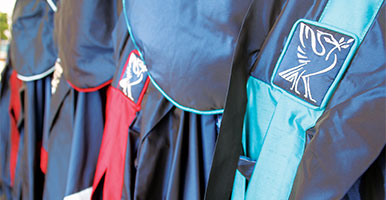Her Honour Elizabeth Steel
Presented by Sir Malcolm Thornton
Honourable Pro-Chancellor, I have pleasure in presenting Her Honour Elizabeth Steel for the award of an Honorary Fellowship from Liverpool John Moores University.
I am delighted to see her children, Elspeth and Iain, and other members of her family, here today to see her receive this award. You are right to be proud of her.
This is a truly civic university, firmly rooted in this extraordinary city, and its defining ethos comprises three deceptively simple yet very powerful words: dream, plan, achieve.
Each July during Graduation Week, the University's highest honour - an Honorary Fellowship - is bestowed on a select band of individuals outside the University, in recognition of their outstanding achievement in a given field or profession, and who personify and inspire others to 'dream, plan, and achieve.' We propose Elizabeth today – we all know her as Liz – on two counts.
Firstly, in recognition of her services to the legal profession following a distinguished law career spanning almost 50 years, during which time she became the first female President of the Liverpool Law Society, and went on to become the country's 21st female judge and also the 21st solicitor to be appointed a judge.
We also propose Liz for services to higher education in Liverpool, following 11 years as a Governor of this University, the last five as Deputy Chairman of the Governing Body.
As the daughter of His Honour Judge Edward Steel of Warrington, where she was born, it is perhaps unsurprising that after being educated at Howell's School in Denbigh, Liz studied law at the University of Liverpool.
She began her career as an articled clerk and then assistant solicitor at Percy Hughes & Roberts in Birkenhead, before becoming a Partner in two of the city's leading firms of solicitors.
She became renowned for her work on equal opportunities and race relations legislation, locally and nationally, and was a member of the Race Relations Board for 8 years in the 1970s. Liz was involved in the first case of harassment and unfair dismissal to come to court under the 1975 Sex Discrimination Act.
In 1989, she was appointed a Recorder, before becoming a circuit judge on the Northern Circuit in 1991, where she remained until her retirement in 2007.
Unusually, she sat in three disciplines – crime, civil and family – liking the different mind-sets each required.
This wide-ranging interest is characteristic of her. Her lifelong love of the arts and drama, both as a spectator and a participant, is reflected in her roles as a member of the General Advisory Council of the BBC and Chairman of its North West Regional Advisory Council.
She was a board member of the Liverpool Playhouse for over 30 years and since 2008, has been a trustee of the Royal Court Liverpool Trust, overseeing the ambitious £11.9 million capital campaign to renovate the Royal Court theatre. For the past seven years, Liz has acted as President of the Liverpool and Merseyside branch of the English-Speaking Union.
She has been a non-executive board member of the Royal Liverpool University Hospital Trust, a trustee of the Liverpool Cathedral Centenary Trust and was elected the first lady President of the Athenaeum in 2002. She was appointed a Deputy-Lieutenant of Merseyside in 1991.
Despite many appointments to national law bodies, she has always maintained a strong connection to Liverpool, which has been her home since university, and where she has raised her family. Indeed, it was where she met her beloved late husband, Stuart, to whom she was married for almost 40 years.
Stuart was a lovely man, well-known in the city and he did, of course, serve as High Sheriff in 2004.
However, at a recent luncheon, Carl Hawkins remarked of Stuart that "with the caution of a true surveyor, he waited 14 years to ask her out!" Liz clearly said yes! Two children and four grandchildren are ample testament to their lives together.
Her skills and experience, and informed commitment to equal opportunities for all, and her belief in the transformative power of education have been demonstrated on many occasions during her long association with Liverpool John Moores University, particularly as Chairman of the Employment Committee.
She has always been a quietly encouraging, wise and equable presence on the Board of Governors, and a partisan and avid supporter of this University and its student body.
On a personal note, I should like to thank Liz for her help and support during my time as Chairman, but, above all, for our friendship over the past 35 years.
Thus, it is with great pleasure that I present Her Honour Elizabeth Steel, this most distinguished daughter of our city, for admission to our highest honour, as an Honorary Fellow of Liverpool John Moores University.



